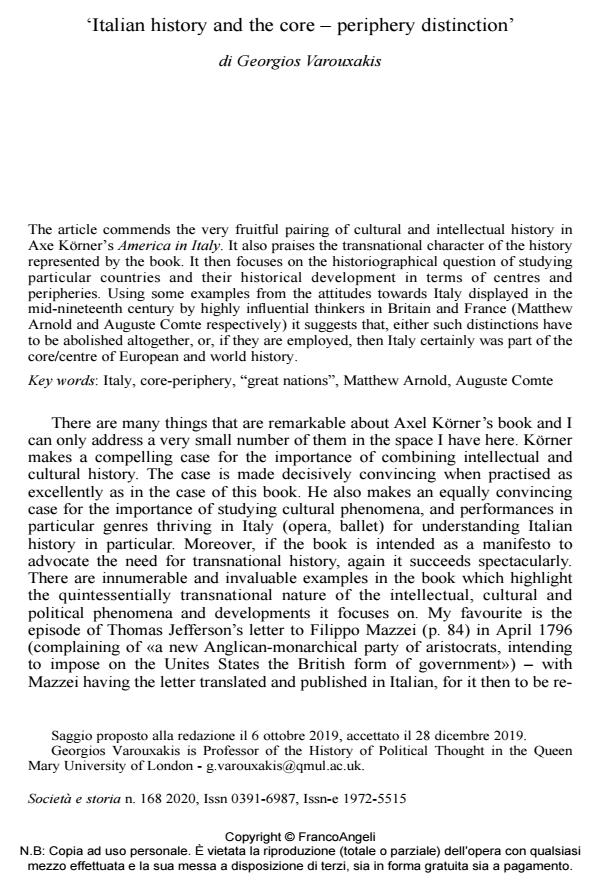"Italian history and the core - periphery distinction"
Titolo Rivista SOCIETÀ E STORIA
Autori/Curatori Georgios Varouxakis
Anno di pubblicazione 2020 Fascicolo 2020/168
Lingua Inglese Numero pagine 6 P. 375-380 Dimensione file 31 KB
DOI 10.3280/SS2020-168009
Il DOI è il codice a barre della proprietà intellettuale: per saperne di più
clicca qui
Qui sotto puoi vedere in anteprima la prima pagina di questo articolo.
Se questo articolo ti interessa, lo puoi acquistare (e scaricare in formato pdf) seguendo le facili indicazioni per acquistare il download credit. Acquista Download Credits per scaricare questo Articolo in formato PDF

FrancoAngeli è membro della Publishers International Linking Association, Inc (PILA)associazione indipendente e non profit per facilitare (attraverso i servizi tecnologici implementati da CrossRef.org) l’accesso degli studiosi ai contenuti digitali nelle pubblicazioni professionali e scientifiche
The article commends the very fruitful pairing of cultural and intellectual history in Axe Körner’s America in Italy. It also praises the transnational character of the history represented by the book. It then focuses on the historiographical question of studying particular countries and their historical development in terms of centres and peripheries. Using some examples from the attitudes towards Italy displayed in the mid-nineteenth century by highly influential thinkers in Britain and France (Matthew Arnold and Auguste Comte respectively) it suggests that, either such distinctions have to be abolished altogether, or, if they are employed, then Italy certainly was part of the core/centre of European and world history.
Parole chiave:Italy, core-periphery, "great nations", Matthew Arnold, Auguste Comte
- Arnold M. (1859), England and the Italian Question, in Id., On the Classical Tradition [The Complete Works of Matthew Arnold, vol. I], edited by R. H. Super, The University of Michigan Press, Ann Arbor, 1960, pp. 65-96.
- Comte A. (1875-1877), System of Positive Policy: Or Treatise on Sociology, Instituting the Religion of Humanity, London, Longmans, Green, and Co. (1851-54).
- Comte A. (1877), The Synthetical Presentation of the Future of Man, in Id. (1875-1877), vol. 4.
- Comte A. (1975), Cours de Philosophie Positive, ed. by Jean-Paul Enthoven, 2 vols., Paris, Hermann. Pickering M. (2018), Conclusion: The Legacy of Auguste Comte, in Bourdeau M., Pickering M., Schmaus W. (eds.), Love, Order, & Progress: The Science, Philosophy, & Politics of Auguste Comte, Pittsburgh, Pennsylvania, University of Pittsburgh Press, pp. 250-304.
- Varouxakis G. (2007), “Great” versus “small” nations: size and national greatness in Victorian political thought, in Bell D. (ed.), Victorian Visions of Global Order: Empire and International Relations in Nineteenth-Century Political Thought, Cambridge, Cambridge University Press, pp. 136-158.
- Varouxakis G. (2019), The Godfather of “Occidentality”: Auguste Comte and the Idea of “the West”, in «Modern Intellectual History», vol. 16, n. 2, pp. 411-441.
- Vernon R. (1986), Comte and the Withering Away of the State, in Id., Citizenship and Order: Studies in French Political Thought, Toronto, University of Toronto Press, pp. 125- 245.
- Vernon R. (2005), Friends, Citizens, Strangers: Essays on Where We Belong, Toronto, University of Toronto Press.
Georgios Varouxakis, "Italian history and the core - periphery distinction" in "SOCIETÀ E STORIA " 168/2020, pp 375-380, DOI: 10.3280/SS2020-168009